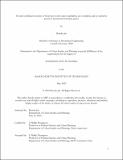Toward a political economy of the power sector: green capitalism, eco-socialism, and co-operative power in decarbonized climate policy
Author(s)
Jin, Brooke
DownloadThesis PDF (1.653Mb)
Advisor
Thompson, J. Phillip
Terms of use
Metadata
Show full item recordAbstract
The political economy of the power sector has been characterized by a putative transition from fossil capitalism to green capitalism in an attempt to mitigate the worst effects of anthropogenic climate change on nature and society. In recent years the rise of green industrial policy, such as the passage of the Inflation Reduction Act of 2022, has sought to stimulate domestic economic development of green-technology projects and implement protectionist trade policies with the normative intent of protecting the geopolitical hegemony of U.S. industry. Yet the objectives of such industrial policies, which function less to reduce carbon emissions than to increase resource- and carbon-intensive consumption patterns, run antithetical to putative state objectives of the decarbonization of the power grid and industrial operations, and in fact green capitalism does not exist without the continued influence of fossil capital.
In this thesis I look to Marxist theories of the state, capital, labor, and nature to illustrate the crises of capitalism that have been occurring due to the exponential increase in power demand by data centers and large technology companies. In reshaping the governance of power markets, electricity generation, and transmission and distribution infrastructure through this increase in demand, called load growth, I show the illusion of sustainability under a green-capitalist political economy that purports to advance decarbonization goals, yet which in actuality facilitates conditions for the centralization and monopolization of private capital, as well as the continued destruction of nature and exploitation of workers. However, this crisis of load growth and the issue of governance that it raises open a window for experimentation into new state systems, socialized modes of production, and labor and environmental solidarity in the creation of a new climate policy: one that prioritizes equity, welfare, ecological preservation, and a truly decarbonized society. I propose a socialization of the power sector to increase community autonomy over their energy needs and to begin to dismantle the technocratic influence of fossil-fuel and large technology companies over electricity generation and access.
Date issued
2025-05Department
Massachusetts Institute of Technology. Department of Urban Studies and PlanningPublisher
Massachusetts Institute of Technology